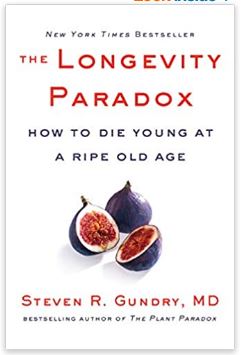The Longevity Paradox - A Synopsis
Garth Willey of CHO Associate Member, the Spiritual Kinship Society Trust, has kindly shared with us his synopsis of The Longevity Paradox - Hiow to Die Young at a Ripe Old Age by Steven Grundy....
In this book, published in 2019, Steven Gundry assesses why the human body inevitably ages and dies – and why/how our ‘health span’ differs from our ‘lifespan.’ Indeed, why our ‘ill-health span’ (my deduction of one from the other!) is lengthening whilst, in the USA at least, life expectancy has recently contracted by 3 years! (He does not quote statistics; and pre COVID-19 of course.)
The paradox, Grundy realised, was that people were living longer but not better. People were being kept alive but without the ability to enjoy their longevity: That ‘lifespan’ and ‘health span’ were all too often two vastly different things. So, he formulated a dietary regime and lifestyle to enable people to retain/regain youthfulness until they die – at a “ripe old age.”
Gundry, born 1950, was a pioneer in open-heart surgery: In fact, he became Professor and Head of Cardiothoracic Surgery at Loma Linda University School of Medicine, California. In 2002 he began transitioning his main focus and his medical practice to being that of a Nutritionist. He’d come to several realisations from “opening people up” and from scientific developments in genetics. In particular, a case where a 4 year old boy with heart disease was cured without surgery turned a light bulb on for him. For more details see https://en.wikipedia.org/wiki/Steven_Gundry .
Genetic science was/is taking great strides forward in understanding why our genetic makeup declines as a consequence of not just aging but our habitual abuse of our bodies – our way of life. In particular, what and when we eat, how we exercise and the amount of good sleep we get all contribute to our health span. AND, changes in our patterns of these factors can bring about dramatic turnarounds in our health. We can optimise far better health and wellbeing whilst living to the upper limits of human lifespan.
Genetic science is beyond most of us, me especially! Our genome is enormous but our exclusive human genes are relatively few, being circa 20,000 in total. Plants have more genes - some nearly double ours. But our total genome embraces primordial and evolutionary developmental mutations and growth. And, as we all know, our bodies are ‘home’ to bacteria, viruses, mitochondria, etc. Good and bad bugs, Gundry calls them, the good ones being our “gut buddies.” They live in us and on us and he likens our bodies to being their condominiums! The good bugs like to keep it clean; whilst the bad bugs are spoilers. Collectively, they make up our microbiome – forming about 90% of our cells. And a healthy microbiome helps keep our human cells young.
- Bacteria digest the food we eat and drink. The bad bugs amongst them crave sugars, fats and junk food.
- Mitochondria (cells that live inside other cells) digest nutrients to produce energy. Mitochondria and bacteria communicate together.
- Lectins are a type of protein that can bind to sugar. They're sometimes referred to as antinutrients. Animal studies suggest that certain lectins can reduce the body's ability to absorb nutrients.
- Our intestinal and colon linings are coated with mucous, which prevents lectins from flooding into our bodies and causing ageing. Certain drugs, non-steroidal anti-inflammatories (NSAIDs) in particular, damage the mucosal layers enabling bad side effects when the bad bugs escape.
- Probiotics
That’s enough for me to interpret in my layman’s language! Gundry’s writing style is easy to read even though the underlying science is complex. And the message is clear: If you want to extend your health span, look after your ‘gut buddies’!
After driving home his ‘diagnosis’ of human health and what it takes to have wellbeing into old age, the second half of the book lays out a lifestyle plan complete with a chapter on supplement recommendations followed by his food recipes and schedules for a varied and healthy diet.
There is also a very good index for ready reference – although when I looked to it to find where he had at least twice referred to 500ml red wine per day being good for you, I could not find it! But under ‘alcohol’ I did find on pages 48 and 49 his judgement that “drinking some alcohol is good for health and longevity and drinking a lot of it is bad.” That’ll do me!
Garth Willey,
Spiritual Kinship Society Trust
Melbourne, Australia








